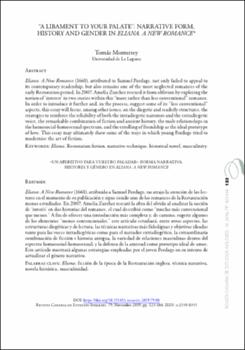“A Libament to Your Palate”: Narrative Form, History and Gender in Eliana. A New Romance
Fecha
2019Resumen
Eliana. A New Romance (1661), atribuido a Samuel Pordage, no atrajo la atención de los lectores
en el momento de su publicación y sigue siendo uno de los romances de la Restauración
menos estudiados. En 2007, Amelia Zurcher rescató la obra del olvido al analizar la noción
de ‘interés’ en dos historias del romance, el cual describió como “mucho más convencional
que menos.” A fin de ofrecer una introducción más completa y, de camino, sugerir algunos
de los elementos “menos convencionales,” este artículo estudiará, entre otros aspectos, las
estructuras diegéticas y de lectura, las técnicas narrativas más fidedignas y objetivas ideadas
tanto para las voces intradiegéticas como para el narrador extradiegético, la extraordinaria
combinación de ficción e historia antigua, la variedad de relaciones masculinas dentro del
espectro homosocial-homosexual, y la defensa de la amistad como prototipo ideal de amor.
Este artículo mostrará algunas estrategias empleadas por el joven Pordage en su intento de
actualizar el género narrativo. Eliana. A New Romance (1661), attributed to Samuel Pordage, not only failed to appeal to
its contemporary readership, but also remains one of the most neglected romances of the
early Restoration period. In 2007, Amelia Zurcher rescued it from oblivion by exploring the
notion of ‘interest’ in two stories within this “more rather than less conventional” romance.
In order to introduce it further and, in the process, suggest some of its “less conventional”
aspects, this essay will focus, among other issues, on the diegetic and readerly structures, the
strategies to reinforce the reliability of both the intradiegetic narrators and the extradiegetic
voice, the remarkable combination of fiction and ancient history, the male relationships in
the homosocial-homosexual spectrum, and the extolling of friendship as the ideal prototype
of love. This essay may ultimately show some of the ways in which young Pordage tried to
modernise the art of fiction.






